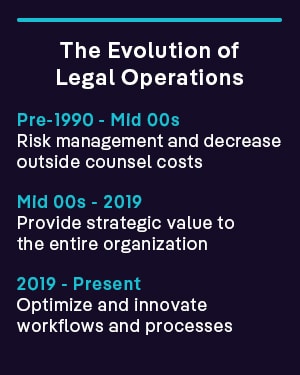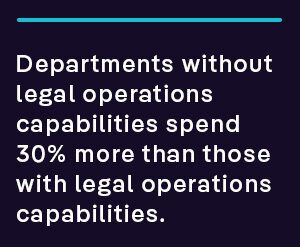In-house legal teams’ organizational structure has evolved in recent decades to include a legal operations function. Corporate Legal Operations Consortium (CLOC) defines legal operations, or legal ops, as a set of business processes, activities, and professionals who enable legal departments to serve their clients more effectively by applying business and technical practices to the delivery of legal services.
This role is often confused with legal administration, but they are entirely different. Legal admin teams help lawyers, legal professionals, and legal operations personnel with the daily administrative tasks that keep their departments running smoothly – proofreading and beautifying reports and documents, maintaining and updating databases and tracking systems, answering phones and scheduling meetings, handling general emails, and more. Legal operations professionals support in-house general counsel, and the entire business, with more strategic work, analytics, and guidance. There are typically four goals that legal operations teams wants to accomplish:
- Improve the legal team’s financial performance, including more advantageous cost controls
- Align the corporate legal team objectives with the organization’s strategic priorities
- Create better collaboration and synergy between the legal team and the entire organization
- Streamline legal services’ processes to improve delivery timelines
- Adopt and implement legal technology that helps meet and exceed organizational goals
While this critical function has been around for more than thirty years, more and more businesses now recognize the important strategic value that legal ops offers and their responsibilities and scope continue to grow. In fact, a survey by CLOC found that even the size of Legal Ops functions has continued to increase. The average legal operations team has 6 full-time employees, with large companies averaging 14 full-time employees and 2 contractors.
The Evolution of Legal Operations
When the idea of legal operations began to form, the role was primarily centered around risk management, as well as how to minimize outside counsel spend. The role, mostly at large organizations, was typically held by one person and was not properly integrated into the legal department’s daily communication.
As the profession progressed, legal ops took on more strategic responsibilities, including both local and international regulation and compliance issues. There was still a heavy reliance on external partners and a desire to understand, analyze, and optimize legal counsel costs.
Fast forward to the mid-2000s to present, legal ops has not only grown in size, but its function has become a more crucial and significant part of the organization. They are tasked with creating legal budgets, vetting technology, vendor management, revamping processes, and much more. They provide strategic support to general counsel and C-level personnel, and play a key role in guiding future business decisions.
Today, according to the CLOC, there are 12 key legal operations functions:
- Business intelligence: Leverage metrics to collect and analyze business intelligence data for more strategic decision-making
- Financial management: Plan legal spend, create budgets, implement and monitor e-Billing for legal services, manage accruals, and forecast expenses
- Firm and vendor management: Analyze current and potential vendors, negotiate rates, and assist with contract management
- Information governance: Create and communicate governance policies, manage data security and compliance
- Knowledge management: Facilitate knowledge hubs and prevent knowledge loss with staff turnover or organizational changes
- Organization optimization and health: Optimize the culture and productivity of their department
- Practice operations: Allocate tasks based on skill level and competencies
- Program and project management: Determine optimal project management, workflows, and programs
- Service delivery models: Define service provider relationships for more strategic outsourced spending
- Strategic planning: Create and implement relevant team goals
- Legal Technology: Researches and recommends legal software to improve the legal departments’ tasks and responsibilities
- Training and development: Establish training resources and guides career development
Building a Successful Legal Ops Team
While legal operations is taking on more complex and vitally important responsibilities, some organizations still face challenges with hiring a full and thriving team. A 2022 Association of Corporate Counsel (ACC) report found that only 60% of legal departments have at least one legal operations professional on the team. What’s preventing legal departments from growing their legal ops?
Budget: Corporate legal departments have the same budget constraints as the rest of the organization. So building a team – or adding to it – can be difficult to justify to stakeholders.
Proof: Unfortunately not everyone understands the value that legal ops can bring to the organization. Unless Return on Investment (ROI) is provided, many leaders refuse to give a new hire additional thought.
Time: In-house legal teams are already overloaded with work. Dedicating time and resources to hire and train new employees can seem challenging.
Luckily legal departments recognize the need for legal ops and are in fact able to overcome these obstacles. Gartner found that departments without legal operations capabilities spend 30 percent more than those with legal operations capabilities. Identifying legal pain points and demonstrating legal ops as a solution is helpful to prove its importance. Perhaps the budget won’t accommodate a director-level position, but exploring contractors can be easier on a budget AND fulfill the department’s need.
Looping in Human Resources is important to off-set the hiring responsibility. Providing a comprehensive list of requirements will ensure the right person is hired. Look for legal operations professionals who have the necessary backgrounds and experience. Some qualifications to consider:
- Legal terminology understanding
- Ethical obligation familiarity
- Ability to address client needs
- Budgeting and financial reporting skills
- Project management training
- Systems implementation experience
- Technology solution analysis
Legal Ops + Technology 
The role of legal ops might sound overwhelming. But there’s good news. Technology can play an essential part in everyday responsibilities, helping to streamline and improve the way in which things get accomplished. In fact, the adoption and implementation of legal technology software and cloud-based solutions have increased tremendously. According to a Data Bridge Market Research report, the legal operations software market is expected to grow at a rate of 14.1 percent between now and 2027.
What technology is available and how does legal ops leverage it throughout a legal matter’s lifecycle? Smart legal tech solutions deliver value to the business through seamless and secure self-service, automating repetitive tasks, and capturing data that can be turned into actionable intelligence:
Intake and Triage:
Streamline and optimize these processes using automation capabilities and self-service systems, saving countless hours and minimizing monotonous work.
Workflow Automation:
Identify repetitive and time-consuming tasks and build workflows to configure steps, delegate work to the right person, and report on relevant data points.
Matter Management:
Track a matter’s metrics and data points to understand lack of personnel concerns or other roadblocks.
Document Management:
Utilize one central repository to house all legal documents and communications. Use document management features, such as version control and editing to avoid disparate and lost matters.
Spend Management:
Control vendor and firm selection and engagement capture various fee structures, and collaborate regarding scope of work and budgets.
Collaboration:
Experience seamless, real-time collaboration with clients and internal stakeholders, including confidential file sharing.
Reporting and Data Analytics:
Leverage artificial intelligence functionality offered in legal technology software to demonstrate team value, offer insights, understand workloads, optimize spend, and improve performance.
Moving Forward
While we have seen exponential growth of legal operations as a field, the nature of the field continues to expand and take on even more significant work. How can Legal Ops teams ensure they continue to accomplish their goals, both efficiently and effectively?
Technology, technology, technology:
Establish a robust legal technology roadmap. Investing in innovative software facilitates the entire contract lifecycle management (CLM) process by automating mundane tasks, streamlining workflows, ensuring compliance, enhancing collaboration…the list goes on and on. Bottom line is that it saves valuable time and has a positive financial impact.
Grow team size:
According to the CLOC, the average Legal Operations full-time employee supports 15 legal team members. Adding more people to the team, whether full-time, part-time, or contract, helps allocate the heavy workloads legal teams continue to experience.
Hiring the right people:
Pinpoint what is missing on the team and ensure the new hire has both the experience and knowledge base to fill the gap.
Effective training:
Having a proven training program helps expedite and energize a new hire’s experience. Create a strong sense of culture, both within Legal Ops and across the organization. Provide ongoing options for necessary certifications or additional training.
Integrate Legal Ops with the entire business:
Legal Ops’ strategic insight guides decisions that ultimately impact the financial health of the company. Ensure the team has ample opportunity to communicate and collaborate with every department to help buy-in, culture, and confidence.
Enhancing Legal Ops with ContractPodAi
Legal Operations is a vital part of any organization, with its necessity and value continuing to expand. To learn how ContractPodAi can help build or enhance your team, contact us today to request a demo or talk to one of our digital transformation experts.




